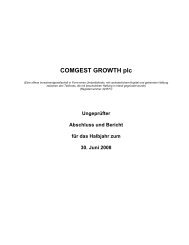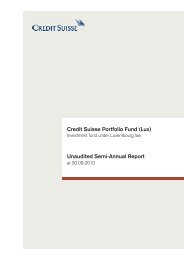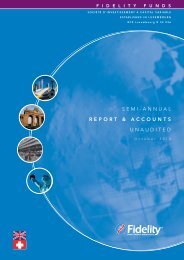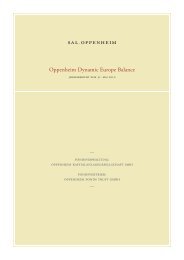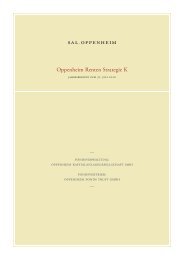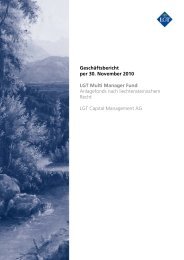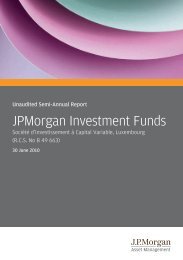Verkaufsprospekt
Verkaufsprospekt
Verkaufsprospekt
Erfolgreiche ePaper selbst erstellen
Machen Sie aus Ihren PDF Publikationen ein blätterbares Flipbook mit unserer einzigartigen Google optimierten e-Paper Software.
tially unlimited until the position is closed, and (8) counterparty<br />
risk as the use of OTC derivatives, such as<br />
futures, forward contracts, swap agreements and contracts<br />
for differences will expose the Sub-Fund to credit<br />
risk with respect to the counterparty involved.<br />
Investment in the FDI outlined above by the Sub-Fund<br />
may involve the assumption of obligations as well as<br />
rights and assets. Assets deposited as margin with<br />
brokers may not be held in segregated accounts by the<br />
brokers and may therefore become available to the<br />
creditors of such brokers in the event of their insolvency<br />
or bankruptcy.<br />
The Sub-Fund may from time to time utilise both exchange-traded<br />
and OTC credit derivatives as part of its<br />
investment policy and for hedging purposes. These<br />
instruments may be volatile, involve certain special<br />
risks and expose investors to a high risk of loss. When<br />
used for hedging purposes there may be an imperfect<br />
correlation between these instruments and the underlying<br />
investments or market sectors being hedged.<br />
Transactions in OTC derivatives, such as credit derivatives,<br />
may involve additional risk as there is no exchange<br />
market on which to close out an open position.<br />
Credit Default Swaps: When the Sub-Fund is the<br />
buyer of a credit default swap, it would be entitled to<br />
receive the agreed-upon value (or par) of a referenced<br />
debt obligation from the counterparty to the swap on the<br />
occurrence of certain credit events in relation to the<br />
relevant reference entity. As consideration, the Sub-<br />
Fund would pay to the counterparty a periodic stream of<br />
fixed payments during the life of the swap if no credit<br />
event has occurred, in which case the Sub-Fund would<br />
receive no benefits under the swap. In circumstances in<br />
which the Sub-Fund does not own the debt securities<br />
that are deliverable under a credit default swap, the<br />
Sub-Fund is exposed to the risk that deliverable securities<br />
will not be available in the market, or will be available<br />
only at unfavourable prices. In certain instances of<br />
issuer defaults or restructurings, it has been unclear<br />
under the standard industry documentation for credit<br />
default swaps whether or not a "credit event" triggering<br />
the seller's payment obligation had occurred. In either<br />
of these cases, the Sub-Fund would not be able to<br />
realize the full value of the credit default swap upon a<br />
default by the reference entity. As a seller of credit<br />
default swaps, the Sub-Fund incurs exposure to the<br />
credit of the reference entity and is subject to many of<br />
the same risks it would incur if it were holding debt<br />
securities issued by the reference entity. However, the<br />
Sub-Fund will not have any legal recourse against the<br />
reference entity and will not benefit from any collateral<br />
securing the reference entity's debt obligations.<br />
Fixed Income Securities: Investment in fixed income<br />
securities is subject to interest rate, sector, security and<br />
credit risks. Lower-rated securities will usually offer<br />
higher yields than higher-rated securities to compensate<br />
for the reduced creditworthiness and increased<br />
risk of default that these securities carry. Lower-rated<br />
securities generally tend to reflect short-term corporate<br />
and market developments to a greater extent than<br />
higher-rated securities which respond primarily to fluctuations<br />
in the general level of interest rates. There are<br />
fewer investors in lower-rated securities and it may be<br />
harder to buy and sell such securities at an optimum<br />
time.<br />
PineBridge Merger Arbitrage Fund<br />
The volume of transactions effected in certain international<br />
bond markets may be appreciably below that of<br />
the world’s largest markets, such as the United States.<br />
Accordingly, the Sub-Fund’s investment in such markets<br />
may be less liquid and their prices may be more<br />
volatile than comparable investments in securities trading<br />
in markets with larger trading volumes. Moreover,<br />
the settlement periods in certain markets may be longer<br />
than in others which may affect portfolio liquidity.<br />
Investment grade securities may be subject to the risk<br />
of being downgraded to a rating that is below investment<br />
grade.<br />
Many fixed income securities especially those issued at<br />
high interest rates provide that the issuer may repay<br />
them early. Issuers often exercise this right when interest<br />
rates decline. Accordingly, holders of securities that<br />
are pre-paid may not benefit fully from the increase in<br />
value that other fixed income securities experience<br />
when rates decline. Furthermore, in such a scenario the<br />
Sub-Fund may re-invest the proceeds of the pay-off at<br />
the then current yields, which will be lower than those<br />
paid by the security that was paid off. Pre-payments<br />
may cause losses on securities purchased at a premium,<br />
and unscheduled pre-payments, which will be<br />
made at par, will cause the Sub-Fund to experience<br />
loss equal to any unamortized premium.<br />
An investment in sovereign debt securities, including,<br />
but not limited to, those issued by sovereign / government<br />
bodies of countries in the Eurozone, may be subject<br />
to credit and / or default risks. Particularly high (or<br />
increasing) levels of government fiscal deficit and / or<br />
high levels of government debts, amongst other factors,<br />
may adversely affect the credit rating of such sovereign<br />
debt securities and may lead to market concerns of<br />
higher default risk. In the unlikely event of downgrading<br />
or default, the value of such securities may be adversely<br />
affected resulting in the loss of some or all of<br />
the sums invested in such securities.<br />
Money Market Instrument Risk: Investors should<br />
note the difference between the nature of a deposit and<br />
the nature of an investment in the Sub-Fund, in particular<br />
the risk that the principal invested in the Sub-Fund is<br />
capable of fluctuation and thus Unitholders may not<br />
have all of their principle returned to them on redemption.<br />
In addition investment in the Sub-Fund will not<br />
benefit from any deposit protection scheme such as<br />
might be applicable to an investment in a bank deposit.<br />
Volatility Risk: All markets are subject to volatility<br />
based on prevailing economic conditions. Securities in<br />
'emerging' or 'developing' markets may involve a higher<br />
degree of risk due to the small current size of the markets<br />
for securities of 'emerging' or 'developing' market<br />
issuers and the currently low or non-existent volume of<br />
trading, which could result in price volatility. Certain<br />
economic and political events in 'emerging' or 'developing'<br />
economies, including changes in foreign exchange<br />
policies and current account positions, could also cause<br />
greater volatility in exchange rates. As stated previously,<br />
some of the markets or exchanges on which a<br />
Sub-Fund may invest may prove to be highly volatile<br />
from time to time.<br />
6. Application for Units<br />
| 264



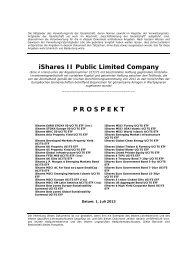
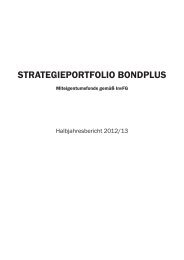
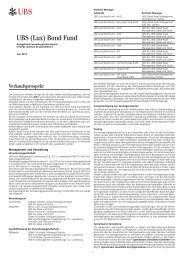
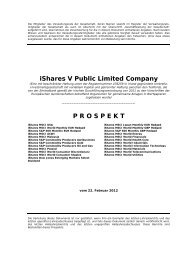
![Prospectus Simplifié daté de [Mars] 2005](https://img.yumpu.com/18875582/1/190x245/prospectus-simplifie-date-de-mars-2005.jpg?quality=85)
